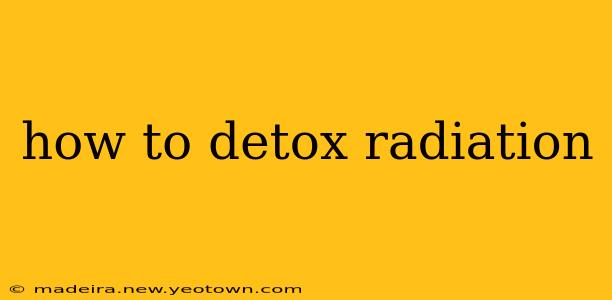How to Detox Radiation: Separating Fact from Fiction
The very phrase "radiation detox" conjures images of frantic measures to cleanse the body of invisible dangers. But the reality is far more nuanced than dramatic infomercials would have you believe. While there's no magic bullet to instantly remove radiation from your system, understanding the science behind radiation exposure and adopting healthy lifestyle choices can significantly mitigate its potential harm. This isn't about a quick fix; it's about long-term well-being and informed choices.
Let's unravel the myths and explore what truly helps manage radiation exposure. Our journey starts with understanding the different types of radiation and how they impact the body.
What are the different types of radiation?
Radiation isn't a monolithic entity. It encompasses various forms, each with its unique properties and effects. We're primarily concerned with ionizing and non-ionizing radiation. Ionizing radiation, like that from X-rays, nuclear fallout, or radon, carries enough energy to strip electrons from atoms, potentially damaging DNA and cells. Non-ionizing radiation, such as radio waves and microwaves, has less energy and doesn't directly cause the same type of cellular damage.
Understanding this difference is crucial. The strategies for addressing exposure differ significantly depending on the type of radiation involved. While we can't "detox" ionizing radiation in the way we might detox from alcohol or certain foods, we can support our bodies' natural repair mechanisms and minimize further damage.
Can I detoxify my body from radiation exposure?
This is where the line between fact and fiction gets blurred. There's no scientifically proven method to rapidly "detox" from ionizing radiation. The body's natural processes, primarily cell repair mechanisms, are responsible for handling the damage. However, supporting these processes through a healthy lifestyle plays a crucial role.
While specific "detox" products claiming to remove radiation often lack scientific backing, a healthy lifestyle can significantly aid the body's natural repair mechanisms.
What are some healthy lifestyle choices that can support the body's natural ability to repair radiation damage?
Think of your body as a remarkably resilient machine. It's constantly repairing itself at a cellular level. We can support this natural process through:
-
A nutrient-rich diet: Focus on antioxidant-rich foods like fruits, vegetables, and whole grains. These foods provide essential vitamins and minerals that are vital for cellular repair. Think blueberries, spinach, and broccoli – your body's tiny repair crew will thank you!
-
Adequate hydration: Water is essential for flushing out toxins and supporting bodily functions, including cellular repair.
-
Regular exercise: Physical activity enhances circulation, helps remove waste products, and promotes overall health, indirectly supporting the body's ability to heal from any damage.
-
Stress management: Chronic stress can weaken the immune system, making the body more vulnerable to the effects of radiation. Practicing stress-reduction techniques like yoga, meditation, or spending time in nature is highly beneficial.
What are some specific foods that can help with radiation detoxification?
No single food magically reverses radiation damage. However, several foods are rich in antioxidants and nutrients that support cellular repair and bolster the immune system. These include:
-
Dark leafy greens: Spinach, kale, and collard greens are packed with vitamins A, C, and K, as well as antioxidants.
-
Cruciferous vegetables: Broccoli, cauliflower, and Brussels sprouts contain compounds that support detoxification pathways.
-
Berries: Blueberries, strawberries, and raspberries are rich in antioxidants.
-
Citrus fruits: Oranges, lemons, and grapefruits are excellent sources of Vitamin C.
What are the long-term effects of radiation exposure?
The long-term effects of radiation exposure depend on several factors, including the type and amount of radiation, the duration of exposure, and individual health. Potential long-term effects can range from increased cancer risk to various other health problems. It's crucial to be aware of these risks and consult with a healthcare professional if you have concerns about radiation exposure.
Conclusion
There's no quick fix or "detox" for radiation exposure. However, focusing on a healthy lifestyle—a balanced diet, regular exercise, stress management, and adequate hydration—supports the body's natural ability to repair cellular damage and maintain overall health. If you have concerns about radiation exposure, always consult with a medical professional for personalized advice and guidance. Remember, proactive health choices are your strongest defense.

